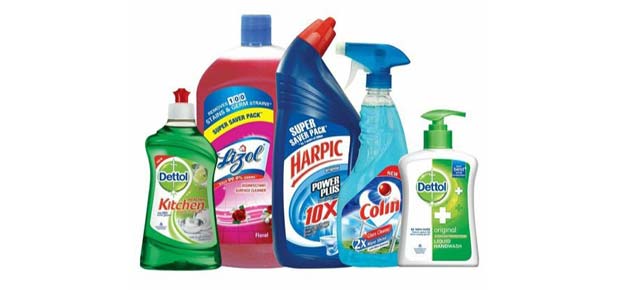Household cleaning products play an essential role to personal and public health. With their ability to loosen and remove soil from a surface, household cleaning products help in achieving a good personal hygiene, in reducing the presence of germs, which cause infectious diseases and extend the useful life of household products and make our homes and workplaces more healthy and pleasant.
On the basis of their usage and application, the four main types of household cleaning products are -
Within these different categories, different types of products are available, which are formulated with products and ingredients to perform a comprehensive range of cleansing functions as well as to impart specific properties to the product. An Understanding of the different products and their specific ingredients and functions will help you in selecting a right product for a specific cleaning application.

Household cleansers are products that are used to clean soft or hard surfaces in the home with the exclusion of laundry and dish items. The field is highly comprehensive in terms of soil and surfaces types to deal with. For example, soils can go from generic dust to clay, oily, greasy, soap scum, water marks, lime scale, mold and mildew. Surfaces can vary from wood to ceramic, porcelain, enamel, glass, marble, stainless steel, metal, carpets and plastics. This wide variety of soils and surfaces cause a significant complexity for the formulator to make sure the products are effective against all types and soils and surfaces with damaging the substrate to be cleaned. Another difficulty is in the fact that the household cleansers are mostly used at room temperature, where reaction kinetics is relatively slow and the contact time between product and surface is relatively small.
Keeping all these complexities in mind, household cleansers are formulated for different types of surfaces and cleansers.
Household cleansing products are formulated in different forms, such as liquids, gels, powders, solids, sheets and pads for uses on various surfaces like painted, plastic, metal, porcelain, glass and on washable floor coverings. Because no single product can deliver superior performance on all surfaces and soils, a comprehensive range of products have been formulated to ensure effective and convenient cleaning. While all-purpose cleaners are available in the market that are intended are for more general use, other product work best under highly specialized conditions.
Abrasive cleansers remove and clean heavy accumulations of soil that are often found in small areas. The abrasive property of these cleansers is provided by different ingredients, such as small mineral or metal particles, nylon particles, fine steel wool or copper. Some abrasive cleansers also disinfect.
Tub, tile and sink cleaners remove normal soils, which can be seen on bathroom surfaces as well as the deposits of hard water, soap scum, rust stains, and/or mildew and mold. These cleansers can also be used to treat surfaces to retard soiling.
All-purpose cleaners penetrate and loosen soil, soften water and prevent the soil from re-depositing on the cleaned surface.
Specialty cleaners are formulated for the soil conditions that are found on specific surfaces, like glass, tile, metal, ovens, carpets and upholstery, toilet bowls and in drains.
Household Cleaning productsMetal cleaners are used to remove soils and polish metalware. Tarnish, the oxidation of metal, is the prime soils, which is found on metalware. products are also available in the market that can be used to protect cleaned metalware against rapid retarnishing.
Oven cleaners are household cleaning products that are formulated to remove burned-on grease and other soils from the walls of oven. Oven cleansers are thick and hence the product will cling to vertical oven surfaces.
Rug shampoos and upholstery cleaners dissolve greasy and oily soils and keep them in the suspension for removal.
Drain openers are household cleaning products that are designed to unclog kitchen and bathroom drains. These cleansers function by creating heat to melt fats, and break them down into smaller substances, which can be rinsed away. Some drain openers use bacteria to prevent build-up of grease that can lead to drain clogging.
Mentioned below are some wonderful home cleaning and solutions from grandma's times when modern day cleansers were not available. Easy to prepare, these cleansers are inexpensive and more environment friendly.

If you have decided to make soap at home, you will need soap making supplies in the form of raw materials, soap making equipment & tools ...
Read More
Someone has rightly said that clothes are not just clothes. They form an integral part of a person's personality and tell a lot about their nature and...
Read MoreCleansing products play an important role in the daily lives of people.
Both soaps and detergents are cleansing products that we frequently use in our
Soap is designed as a product to be used once and then flushed down the drain...